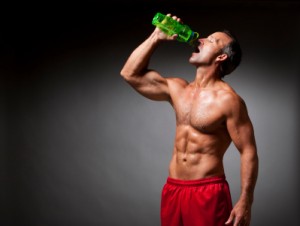 We’ve all seen the advertisements of the sweaty, exhausted athlete pausing to take a sip of a brightly-colored drink and then going on to score the winning goal or set a personal record. Magazines and web sites – especially in these days when Olympic athletes dominate the news – are filled with fitness products that supposedly make you perform better or recovery more quickly. But are any of those claims true?
We’ve all seen the advertisements of the sweaty, exhausted athlete pausing to take a sip of a brightly-colored drink and then going on to score the winning goal or set a personal record. Magazines and web sites – especially in these days when Olympic athletes dominate the news – are filled with fitness products that supposedly make you perform better or recovery more quickly. But are any of those claims true?
A group of researchers at the University of Oxford set out to answer that exact question. They analyzed magazine advertisements and web sites of 104 different fitness products looking for real evidence behind their claims. Then they wrote to manufacturers of fitness products asking for references to research that backed up their claims.
But their study did not find much credible evidence. More than half of the web sites they reviewed did not provide any references. They did find a total of 146 specific references to study, but they were only able to find 76 studies to review.
None of the studies they found were systematic reviews. Eighty-four percent were judged to be of high risk-bias, and only 58 percent used randomization. In total, only three of the studies were judged to be high quality.
The study was thoroughly reported on in the New York Times, along with responses from beverage manufacturers and from health and nutrition experts not involved in the study.
Politics aside, there is a clear lack of evidence about whether performance-enhancing products really work.



Speak Your Mind